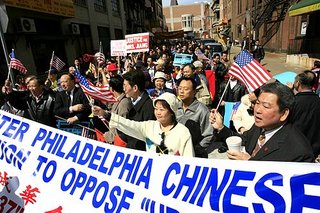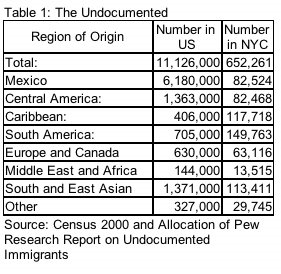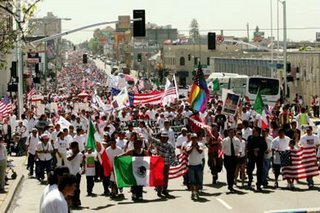 Asian-Pacific Islanders (APIs) protest in Texas against HR 4437 anti-immigrant legislation on May 1, 2006.
Asian-Pacific Islanders (APIs) protest in Texas against HR 4437 anti-immigrant legislation on May 1, 2006.I'm sure that there are forces already at work trying to undermine the burgeoning immigrant rights movement that has surged forward in the last couple months. Not that I'm a conspiracy-theorist, I just know how the US government and others powers that be work, and they can be very threatened by large mobilizations of people who were formally unorganized and had little voice in the public dialogue, like undocumented immigrants.
I also know how the liberal-left elements in our society work--they often fight with each other over crumbs while the Right remains fairly united and chips away slowly and steadily at our civil and human rights, and at the social-democrat ideology that is at the root of some of these rights.
Efren rants about the flaws of both the current US immigration policies and what he broadly calls 'immigration activists'. He bemoans the fact that the largely Latino-focused mobilizations and organizations that have been so visible in recent days have not reached out to API constituents. It's an argument I've heard from other APIs who are feeling, I think, a little bitter at yet another example of our invisibility in this society. We APIs are very much affected by
HR 4437, the legislation that these protests are responding to, although the issue is still a divisive one in our very heterogenous racial group (in terms of class, nationality, language, culture AND immigration status). But we still haven't turned out in large numbers in the streets--at least not in California. Why not?
The answer to this, really, is quite simple, and can be reflected in this chart that I found via a news article posted on another blog.

And in California, the number of Latinos is roughly three times the population of Asians, according to the
2000 Census. Of course, this count probably excludes many 'illegals' of both Latino and Asian background because of folks' fears of being caught and deported, but it's probably safe to say that the number of Latinos in California and in the US far exceeds that of APIs. Also, in 2003, the Census bureau reported that
Latinos had surpassed African-Americans as the largest minority in the US. So in terms of sheer numbers, it makes sense that Latinos would be present in large numbers during these protests.
I think it's interesting that API activists are saying that these 'Latino organizations' (which I doubt many of these activists could name but are quick to blame for the lack of API presence) should reach out to APIs, when in fact many immigrant rights groups (a good listing can be found on the
National Network for Immigrant and Refugee Rights web site, have an API component or have relationships with API constituencies.
Efren and others have also questioned the effectiveness of boycotts as a strategy to make change. On some counts, I agree with them. After all,
HR 4437 is still alive, and could still pass into law. Boycotts, though, are just one tactic in a larger strategy that many groups are participating in that includes lobbying of Senators and Congresspeople through letter-writing, phone calls, emails, etc. And those forms of civic participation are equally important and necessary to actually win the policy victories that we need to change the concrete conditions (police repression, INS harassment, mass deportations, etc.) in this society.
But boycotts and strikes--especially of the May Day variety, which were fairly spontaneous and organic, and involved hundreds of thousands if not millions of people in mass action--can be extremely effective in conveying to policymakers the number of people that feel strongly on an issue. Especially in this day and age, with the Left-liberal elements of the US political landscape having so little hold on mainstream media, these large mobilizations are very effective at at least calling attention to the issue, however briefly, and forcing the mainstream media to give us air time.
My two cents. But yes, boycotts and strikes are part of a larger strategy, and are not the solutions in and of themselves. Which is one thing I'm already hearing that this burgeoning immigrant-rights movement is already debating amongst themselves. This sentiment was encapsulated perfectly for me in my favorite chant from the May Day march in San Francisco: "Hoy Marchamos, Mañana Votamos!"--Today We March, Tomorrow We Vote.






